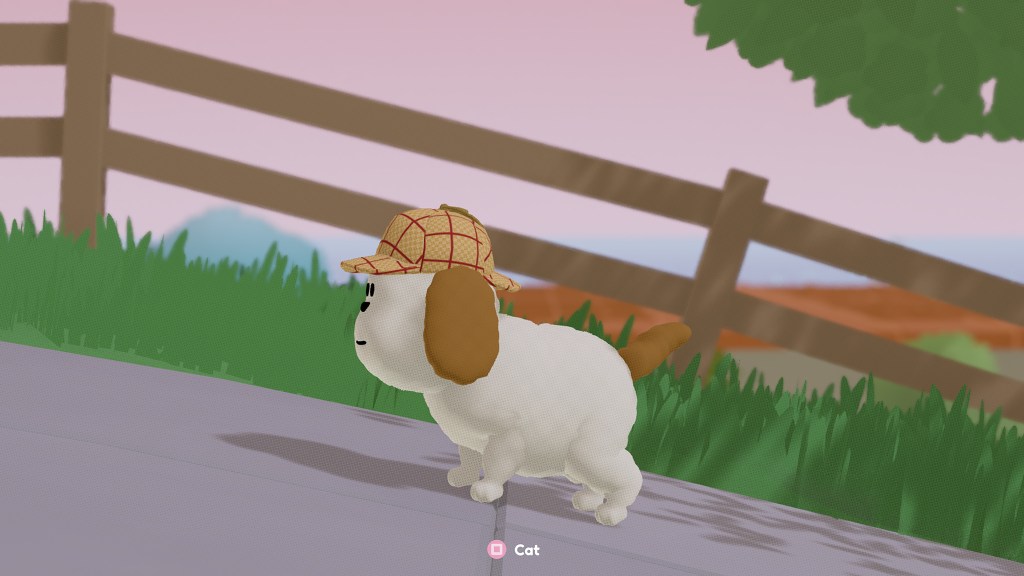to a T wants to let you know that you’re fine the way you are. It repeats this ad nauseam through a catchy jingle at the beginning of each of the eight chapters. Moments of radical acceptance filtered through an obscene amount of whimsy, mostly aimed at children, capture what this latest title from Katamari Damacy director Keita Takahashi does well. It’s a game beaming with positivity, but that optimism doesn’t always cover up its many weak spots.
Videos by ComicBook.com
The positivity is built into the game’s narrative since the main character is stuck in a permanent T-pose with their tiny arms jutting straight as if they were born without elbows. This unusual characteristic makes them the butt of the joke for some kids and is a clear parallel to the hardships real children living with real disabilities have.

Depicting disability through this quirky lens is thoughtful, but the best part is how the child handles it. While still understandably crestfallen when bullied, they’re never angry at their body or visibly depressed at how they have to work harder than other kids. They have some assistance and a few special tools, but they’re not seen or portrayed as patronizing crutches. It’s just an accepted part of their life and handled in a mature way that deftly avoids the cliché of the angry disabled person having to accept their body. It’s not the kid that has to mature; it’s some of the people around them.
RELATED: Xbox Game Pass Adding 2024 Game of the Year, New Day One Releases, and More
Some of the gameplay lets players experience this, too, since some of the menial daily tasks have been gamified. Brushing their teeth, eating breakfast, getting dressed, and cleaning up are all interactive and have players contorting the sticks to move their stiff appendages to get the job done. It’s a small gesture, but it at least lightly mirrors having to adapt to the small annoyances that come with doing simple routine chores when disabled. Players may improve their skills doing these tasks through sheer repetition, but they’re never all the way intuitive, and that’s quite fitting.
And while not technically mandatory most of the time, these habitual responsibilities get tedious and point out the game’s issues around repetition and pacing. Having to get up every morning and do the same things may get the aforementioned point about needing to overcome the small struggles that come with everyday tasks, yet they are tiring to do every day and waste time. The songs that begin and end each day are similarly complicated since both are charming earworms with heartwarming messages, but repeat too often. It would have been more apt to have unique songs for each chapter.
It’s understandable that the more gamey elements aren’t mechanically deep, since a lot of the interactions aren’t much more than quick-time events. Many of them benefit from the game’s childish charm, like the mini-game that has players catching falling ice cream scoops or the gym class stretching mini-game that tests the player’s memory.
The interactive parts outside of these brief snippets are where the pain begins. The map is atrocious and doesn’t orient to the player’s position, and is made worse by the fixed camera. It may be there to make the game more manageable for players with limited dexterity, but it just restricts the player’s viewpoint, makes the world appear smaller, and ensures traversal is even more of a nightmare. There are coins to collect and cosmetics to buy, but those are not enticing activities because of how arduous the sunny coastal town is to explore.

to a T is mainly memorable for its noninteractive sections, but even those are inconsistent. The aforementioned message about living with a disability is novel, and developer Uvula attempts to weave this into a broader plot but loses steam beyond the introduction. It moseys around with unrelated tangents, and when combined with the time wasted repeating songs and doing the same daily tasks, to a T’s pacing suffers. It isn’t able to fully exploit its themes of how seeking perfection leads to unhappiness and rushes through the appropriate odd revelation in the final act.
The absurdity of this closing stretch and the healthy amount of silly jokes peppered throughout make it all a little easier to swallow because they are a solid reminder of what to a T does well. Even with its flaws and unforced errors, to a T is an adorable game with a heartwarming message that comes at a time when eugenics-powered attacks on the disabled community spearheaded by heartless ghouls are in full force in the United States. It’s a small blip within the chaos, but media that encourages empathy and spotlights smaller communities is always welcome, even if the camera controls aren’t ideal.









